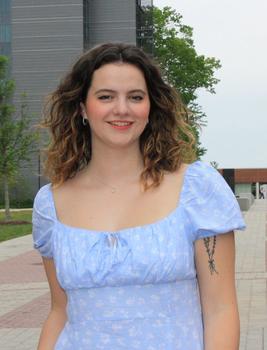Avery Shippen strives to spark positive change with an interdisciplinary approach.
As a University Scholar, Avery Shippen is among a small group of the most motivated Honors College students who were selected through a competitive process to join a four-year cohort of student leaders, receive a full-tuition scholarship, and participate in enhanced academic and professional development programming. Her passion in both the arts and public sector motivates her to seek out creative solutions to tackle deeply rooted conflicts that affect the lives of individuals within marginalized communities. Having attended George Mason University's Quill Camp, she realized her intersecting areas of interest aligned well with the university's Jimmy and Rosalynn Carter School for Peace and Conflict Resolution's programs. Since joining, she has continued to explore the overlap between the two topics through various academic and organizational opportunities.

Jeffrey Zitomer: Where are you from?
Avery Shippen: I’m originally from Nashville, Tennessee. Born and raised. I stumbled upon George Mason when I was looking for a university that had a good Arts program. But I was also interested in the government and non-profit sectors, and the proximity to DC was appealing. The University Scholars scholarship made it much more feasible for me to attend an out-of-state school.
Jeffrey: What are you passionate about? What clubs or organizations have you joined at George Mason?
Avery: I am the Vice-president of Membership Recruitment for the Pan-Hellenic Council, which is the encompassing body for seven sororities. I’m also the lead graphic designer for the Patriot Activities Council, which is a departmental organization that works to provide free or low-cost events to build community at George Mason, like Homecoming and Mason Day.
I also really love to read. I love to cozy-up with a good book and a cup of tea. I don’t care what the topic is! I’m currently going through the New York Times Top 100.
Jeffrey: Why did you choose the Carter School?
Avery: I really lucked into the Carter School. I attended Quill Camp before enrolling, and I was the only art student – everyone else was government and international relations – and I was persuaded to join after some meaningful conversations with Carter Students. I was interested in joining because design and conflict resolution share a lot of similarities on how humans interact with their environment; they’re both focused on the needs of others. It made sense to combine the two.
Jeffrey: What was your favorite course at the Carter School, so far?
Avery: I loved Conflict 375: Peacebuilding Field Experience. I took it when I was doing the Peacebuilding Fellowship. The course is structured around creating a thesis on a project of your choice with bottom-up peacebuilding. I worked with eight other students in my class, and we did research, wrote papers, and worked on projects that could be implemented. My paper was on integrating place-based education into rural Appalachian schools.
Jeffrey: How did the Honors College prepare you for your success at George Mason?
Avery: I adore how close-knit the Honors College is. You really get to know your instructors and classmates. Getting those networking opportunities has really helped my academics.
Jeffrey: Ideally, what would you like to do, post-graduation?
Avery: I’m really interested in working with youth and with local government or non-profits. I want to find a way to include creative processes to help marginalized communities recover after conflict.
Jeffrey: Do you have a message for anyone considering George Mason?
Avery: George Mason offers so many opportunities and avenues for success, it’s hard not to grow as a person. There’s array of clubs, academic fields, and opportunities for students to experience. I also love the diversity here because the different perspectives mirrors how the real world operates.
